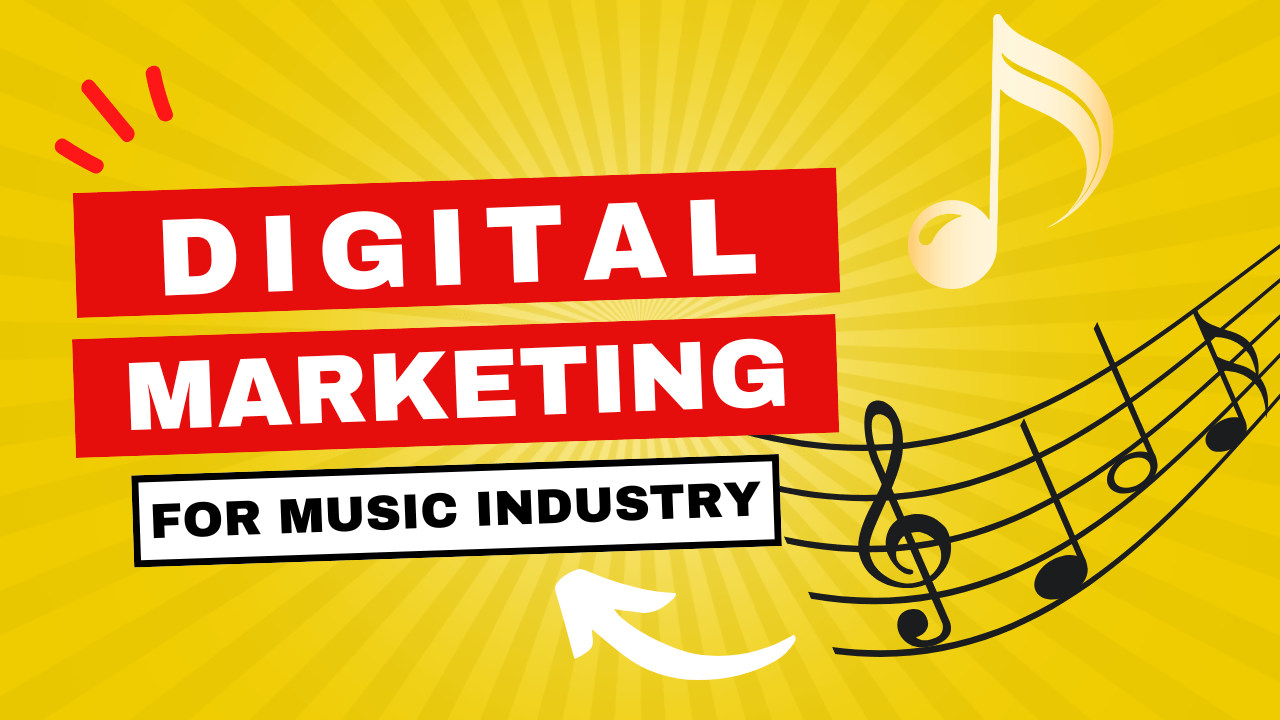In today’s digital era, the music industry has transformed remarkably. Gone are the days when artists solely relied on physical sales and traditional media for exposure. Now, digital marketing for the music industry is crucial for success. It enables artists to reach a global audience, engage with fans, and promote their music effectively. This comprehensive guide will explore essential strategies and tools for musicians to thrive in the digital world.
What is Digital Marketing for the Music Industry?
Digital marketing for the music industry involves promoting music, artists, and related products through digital channels. These channels include social media, streaming platforms, websites, email, and online advertisements. The goal is to increase visibility, grow fan engagement, and drive music sales or streams. It encompasses various techniques like content marketing, SEO, social media management, and more.
The Importance of Digital Marketing in the Music Industry
The rise of digital platforms has made it easier for artists to share their work with a broader audience. However, it has also increased competition. Here’s why digital marketing for the music industry is crucial:
- Global Reach: With digital marketing, artists can reach audiences worldwide, breaking geographical barriers. This global access allows musicians to connect with diverse fan bases and gain international recognition, which was previously challenging without major label support.
- Cost-Effective: Digital marketing offers affordable solutions compared to traditional marketing methods. Traditional advertising, such as TV or radio spots, can be costly and inaccessible for independent artists. In contrast, digital platforms offer scalable options, allowing artists to start with minimal budgets and expand as they grow.
- Engagement: It allows direct interaction with fans, creating a loyal fan base. Through social media and other digital platforms, artists can engage with their audience in real-time, fostering a personal connection that can enhance loyalty and support.
- Data-Driven Decisions: Digital tools provide analytics to understand audience preferences and tailor marketing strategies accordingly. This data-driven approach enables artists to refine their campaigns, target specific demographics, and optimize their efforts for better results.
Key Strategies in Digital Marketing for the Music Industry
Social media platforms like Instagram, Facebook, Twitter, and TikTok are powerful tools for promoting music. Artists can share updates, behind-the-scenes content, and engage with fans. Here’s how to leverage social media:
- Content Creation: Regularly post engaging content such as music videos, live performances, and personal stories. Creating visually appealing and relatable content can help attract new followers and keep existing fans engaged.
- Interaction: Respond to comments, hold Q&A sessions, and use polls to engage with your audience. This direct interaction helps build a community around your music, making fans feel valued and involved.
- Collaborations: Partner with influencers or other artists to expand your reach. Collaborations can introduce your music to new audiences and create buzz around your releases.
2. Search Engine Optimization (SEO)
SEO is vital for improving your online presence. By optimizing your content, website, and profiles, you can rank higher on search engine results, making it easier for fans to find you. Key SEO practices include:
- Keyword Research: Use tools like Google Keyword Planner to find relevant keywords. Focus on terms that potential fans might use to search for your music or similar genres.
- On-Page SEO: Optimize your website’s meta titles, descriptions, and content with targeted keywords like digital marketing for the music industry. Ensure that your website is user-friendly and mobile-optimized to provide a good user experience.
- Off-Page SEO: Build backlinks from reputable sites to boost your site’s authority. Engaging in guest blogging, interviews, and collaborations with other artists can generate quality backlinks and improve your site’s visibility.
3. Email Marketing
Email marketing is an effective way to communicate directly with your fans. It’s personal, targeted, and measurable. Strategies for email marketing include:
- Newsletter: Send regular newsletters with updates, exclusive content, and upcoming events. This keeps your fans informed and excited about your music journey.
- Fan Segmentation: Segment your email list based on fan preferences and behavior. Tailor your messages to different segments, such as superfans, casual listeners, or concert-goers, to increase relevance and engagement.
- Personalization: Use personalized content to increase engagement rates. Address fans by their names and include personalized recommendations based on their past interactions.
4. Streaming Platforms and Playlists
Streaming platforms like Spotify, Apple Music, and YouTube are essential for reaching a wide audience. Here’s how to optimize your presence:
- Profile Optimization: Ensure your artist profile is complete with a bio, links, and high-quality images. A well-optimized profile enhances your professionalism and helps new listeners discover more about you.
- Playlist Pitching: Submit your music to playlists for better visibility. Playlists can significantly boost your streaming numbers and expose your music to new listeners.
- Analytics: Use platform analytics to understand listener demographics and preferences. These insights can guide your future releases and marketing strategies, ensuring they align with your audience’s tastes.
5. Content Marketing
Content is king in digital marketing. Creating valuable and engaging content can attract and retain fans. Here are some content marketing ideas:
- Blogging: Write blogs about your music journey, inspirations, and industry insights. Blogs can establish you as an authority in your genre and provide fans with a deeper understanding of your work.
- Vlogging: Share video content like studio sessions, music tutorials, or daily life. Vlogs offer a behind-the-scenes look at your life as an artist, making fans feel more connected to you.
- Podcasts: Start a podcast to discuss music, interview other artists, or share stories. Podcasts can reach a different audience and provide a platform for in-depth discussions about your music and experiences.
6. Paid Advertising
Investing in paid ads can accelerate your growth. Platforms like Google Ads, Facebook Ads, and Instagram Ads offer targeted advertising options. Here’s how to use them:
- Target Audience: Define your target audience based on demographics, interests, and behaviors. Detailed targeting ensures that your ads reach the right people, maximizing your return on investment.
- Ad Formats: Experiment with different ad formats like video ads, carousel ads, and sponsored posts. Use eye-catching visuals and compelling calls-to-action to capture attention and encourage engagement.
- Budgeting: Set a budget and monitor your ad performance to optimize spending. Start with a small budget to test different strategies, and gradually increase spending on the most successful campaigns.
Tools and Resources for Digital Marketing in the Music Industry
Several tools can help streamline your digital marketing efforts. Here are some essential ones:
- Hootsuite: For social media scheduling and management. It helps you plan and automate posts, making it easier to maintain a consistent presence.
- Mailchimp: For email marketing automation. Mailchimp offers customizable templates and analytics to track your campaigns’ performance.
- Google Analytics: For website traffic analysis. It provides insights into your visitors’ behavior, helping you optimize your site for better engagement.
- Spotify for Artists: For streaming data and audience insights. It gives you access to real-time data on your streams, listeners, and playlists, allowing you to tailor your strategies.
Building an Online Presence: Best Practices
Building a strong online presence requires consistent effort and strategic planning. Here are some best practices:
- Consistency: Maintain a consistent posting schedule on all platforms. Regular updates keep your audience engaged and signal that you are an active artist.
- Branding: Develop a unique brand identity with a consistent look, feel, and tone. Your branding should reflect your music style and personality, making it easier for fans to identify and connect with you.
- Engagement: Actively engage with your audience through comments, messages, and live interactions. Engagement builds a sense of community and makes your fans feel valued.
- Collaboration: Collaborate with other artists and influencers to expand your reach. Collaborations can introduce you to new audiences and provide opportunities for creative growth.
Challenges in Digital Marketing for the Music Industry
While digital marketing for the music industry offers numerous benefits, it also presents challenges:
- Oversaturation: The market is crowded, making it difficult to stand out. With countless artists competing for attention, breaking through the noise can be challenging. To overcome this, focus on building a unique brand and connecting with your audience on a personal level.
- Constant Changes: Digital platforms and algorithms constantly evolve, requiring continuous adaptation. Staying updated with the latest trends and platform changes is crucial to maintaining an effective digital marketing strategy.
- Time-Consuming: Managing multiple platforms and creating content can be time-intensive. Juggling different aspects of digital marketing, from social media to email campaigns, requires careful planning and time management.
Future Trends in Digital Marketing for the Music Industry
The landscape of digital marketing for the music industry is ever-evolving. Here are some future trends to watch:
- AI and Personalization: AI will enable more personalized marketing experiences, from music recommendations to tailored content. AI algorithms can analyze listener data to create customized playlists and suggest music based on individual preferences. This level of personalization can enhance the listener experience and increase engagement.
- Virtual and Augmented Reality: VR and AR will offer immersive experiences, such as virtual concerts and interactive music videos. As technology advances, artists can create unique virtual experiences that go beyond traditional music performances. These innovations can provide new ways for fans to connect with their favorite artists and enjoy music in an entirely new way.
- Short-Form Content: Platforms like TikTok and Instagram Reels will continue to dominate with short, engaging content. Short-form videos are perfect for capturing attention quickly and delivering impactful messages. Artists can use these platforms to share snippets of new music, behind-the-scenes moments, and creative challenges, keeping their audience engaged and entertained.
Conclusion
Digital marketing for the music industry is an indispensable tool for artists today. It enables them to reach global audiences, engage with fans, and promote their music effectively. By leveraging social media, SEO, content marketing, and other digital strategies, artists can build a strong online presence and succeed in the competitive music landscape.
Digital marketing provides numerous opportunities for artists to connect with their audience, grow their fanbase, and achieve their career goals. While it comes with challenges, the benefits of a well-executed digital marketing strategy far outweigh the difficulties. By staying informed about the latest trends and best practices, artists can continue to thrive in the digital age and make a lasting impact with their music.
For further reading, explore these related articles:
- Instagram Marketing for Musicians: Grow Your Fan Base
- Exploring the Functionality of Shared Libraries in Digital Platforms: A Deep Dive into 7digital and Snapchat
- Key Factors Affecting Apple Music Earnings Per Stream
For additional resources on music marketing and distribution, visit Deliver My Tune.






